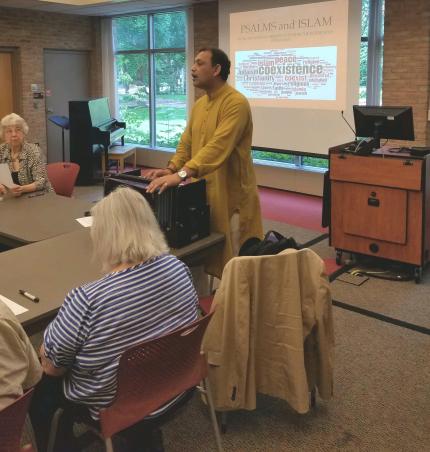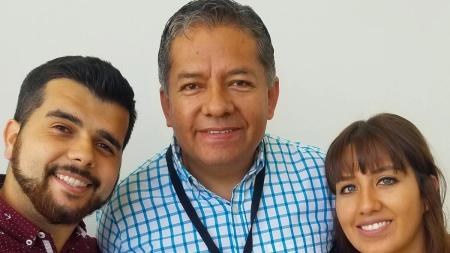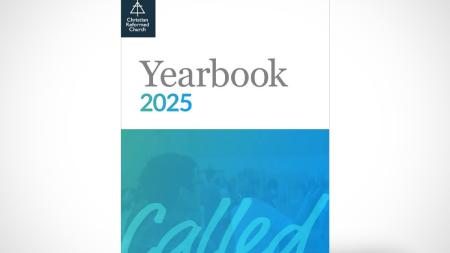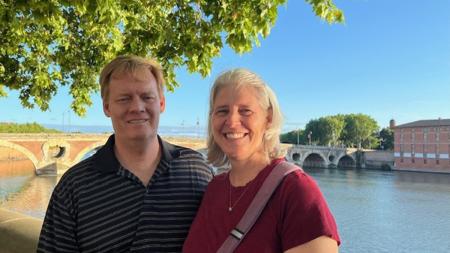Using the Psalms to Connect with Muslims and the Quran

Eric Sarwar sings Hymn of Reflection
Chris Meehan
Accompanying himself on the harmonium, Eric Sarwar led a small group of people in singing a hymn of response that he wrote using words and images from the Bible, especially the psalms.
“Your light is burning in the temple of my heart, beating holy, holy, in the temple of my heart,” sang Sarwar, a Presbyterian pastor from Pakistan who recently visited the Calvin Institute of Christian Worship to talk about a movement of using the psalms as a way to work on peacemaking with Muslims.
“You are light from light, my power and might, O Lord!” he sang. “In every storm you are my shelter strong, Messiah.”
In response to these words of worship, the dozen or so people gathered around a table at the Meeter Center in the Calvin College library sang: “Hal-le-lu-jah, hal-le, hal-le, hal-le-lu-jah!”
Sarwar is pastor of Artesia City Church, in Artesia, Calif., which receives grant funding and support from Resonate Global Mission for community engagement and intercultural partnerships as well as other church expenses. They are one of Resonate's church plants/partners. On Sunday, before speaking at Calvin, Sarwar presented this hymn during worship on Sunday, June 10, at Church of the Servant CRC in Grand Rapids, Mich.
In his native Pakistan, he has helped organize psalm festivals that gather Christians, Muslims, and others to sing songs based on these poetic expressions. When this happens, he said, participants often experience a groundswell of togetherness that transcends theology and cultural differences.
In fact, Emily Brink, who introduced Sarwar before his talk, met Sarwar in the early 2000s when she attended two psalm festivals in Pakistan.
At that time, a growing number of religious scholars in Pakistan and elsewhere had begun to take notice of how the psalms seemed to be breaking down barriers.
“We are now seeing that the psalms can help pave the path to [engage] Islam. They can be a prophetic call that bridges the peacemaking process,” said Sarwar.
With music composed by himself and others, the CRC musician and pastor has been appearing at various conferences and gatherings to share his message that Muslims, like Christians, consider the Psalms as part of God’s revelation.
He presented this message at the University of Notre Dame before visiting Grand Rapids and returning to Fuller Theological Seminary in Pasadena, Calif., where he is finishing his Ph.D. in intercultural studies.
While Christians and Jews consider the psalms as recorded in Scripture to be the Word of God, Muslims see the Psalms as a holy book because it is mentioned several times in the Quran, Islam’s sacred text, said Sarwar. But neither the Jewish Torah nor the Old Testament are comparable to the Quran.
“The Christian concept of ‘the Psalms’ as a set of one hundred and fifty poems, and the Muslim concept [of them in connection with] the Quran are entirely different,” he said.
Because several sections of the Quran reference the book of Psalms, many Muslim scholars consider the Psalms a part of God’s revelation. However, “Muslims neither read nor recite the Psalms as a separate book, but instead believe that previous books later emerged in the Quran and they don’t need to read any other divine book.”
Nonetheless, because they are viewed as part of God’s revelation, the Psalms can be used to help unite “people of the book” -- Jews, Christians, and Muslims, posits Sarwar..
In a paper titled Psalms: A Prophetic Path to Engaging Islam, Sarwar writes: “In the past fourteen centuries, the engagement between Christianity and Islam has been mostly based upon doctrinal confrontations, militant crusades, and power plays.”
The psalms, on the other hand, have not necessarily been part of the struggle that has often occurred over religious practices about how the Bible compares to the Quran and over the divinity of Christ.
“The psalms have sat quietly there, and no one has argued over them,” said Sarwar, a graduate of Calvin Theological Seminary.
A key element of the psalms is that they can draw people together “in a community of song,” he said. “The psalms do not contain anything accusatory or that incites accusation.”
The second chapter of the Quran, said Sarwar, contains many references to the book of Psalms. Some parts of the Quran also use words similar to those of the psalms. The Quran says, in Surah 34:1, “Praise be to God, to Whom everything in the heavens and everything in the earth belongs, and praise be to Him in the Hereafter.”
In addition, Muslims, especially Sufi Muslims, consider David, the shepherd-king who wrote many psalms, to be a great prophet.
“In Islam, David’s role as a social religious reformer is a ‘voice-centered piety’ without any musical accompaniment,” writes Sarwar in his paper.
Two prominent Islamic scholars, he adds, “are convinced that David as a singer, poet, and prophet is a bridge not only for religious purposes but also for social change as well.”
Given the connections Christians and Muslims share with the psalms, putting these poems to music and singing them together can be a powerful way of living out the missio Dei, the saving mission of God, and the Great Commission Christ gave his disciples.
The book of the Psalms is comparable to the Quran “as a prayer book, lectionary, and hymnal rolled into one,” said Sarwar. “The study of the practice of the Psalms and the Quran opens out automatically into the public domain of Muslim society.”


